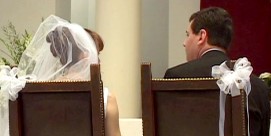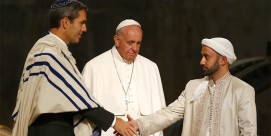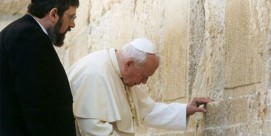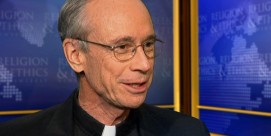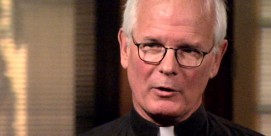In This Episode << SLIDE LEFT TO SEE ADDITIONAL SEGMENTS
Analysis of Papal Resignation
BOB ABERNETHY, host: Pope Benedict XVI stunned this world this week with the surprise announcement that he has decided to resign—the first pope to step down in 600 years. Our coverage today includes analysis from two experts on the church, and it begins with reaction from Catholics and non-Catholics alike, gathered by our managing editor, Kim Lawton.
Kim and I are joined now by Father Tom Reese of the Woodstock Theological Center at Georgetown University, and David Gibson of Religion News Service, author of The Rule of Benedict: Pope Benedict XVI and His Battle with the Modern World. David is in New York. Welcome to you both. David, let me begin with you. What do you think the cardinals will be looking for most eagerly when they meet to choose a successor?
DAVID GIBSON (Religion News Service): Well, Bob, I think they’re going to take for granted that whoever they choose is going to be an orthodox cardinal and follower of pretty much the line of Benedict XVI and the previous popes in terms of doctrine and all the hot-button issues that we often like to talk about. I think they are also looking at someone who might be a bit younger. Some of the cardinals have said they don’t want to elect anyone who’s over 70. Benedict XVI was 78 when he was elected eight years ago. But I think the big choice really facing them is whether they are going to go outside of Europe really for the first time in the modern era, the first time almost ever, and pick someone from the southern hemisphere, from Latin America, Asia, or Africa, really where the Catholic Church is booming, which is the real future of the church there, and are they going to pick a pope who reflects that growth?
ABERNETHY: Tom?
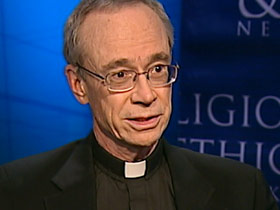
REV. THOMAS REESE, S.J. (Woodstock Theological Center, Georgetown University): Well, I think the cardinals are going to be looking for three things. One, somebody who they think will make a good pope, which means somebody who agrees with them on their values and what they think of the vision of the church. The second is someone that they can have a personal relationship with. I mean they’d really like to have a friend in the pope, and third, I think they want someone who will be accepted and liked in their own country. I mean you think, for example, of the cardinals that live in countries with lots of Muslims. You don’t want the pope saying something that upsets Muslims because that would not be good for the people in their country.
ABERNETHY: And, whoever it is, Tom, is there any possibility at all that some of the things that Americans, especially American liberals, want most, which are things like permission for there to be married priests?
REESE: No.
ABERNETHY: No possibility at all?
REESE: I don’t think so. You have to remember that more than half of the cardinals who are going to choose the next pope were appointed by Benedict, and the rest of them were all appointed by John Paul II, and they did what you or I would do if we were pope. They appointed people who basically agree with them on the issues facing the church, so anyone who was in favor of women’s ordination, or changing birth control, or married priests would never have made it into the College of Cardinals.
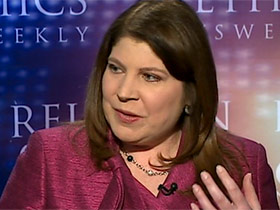
KIM LAWTON, managing editor: One of the things I’ve found really interesting as I was talking with people this week was how the questions of who we are going to pick also lead to questions about the nature of the papacy and it’s just become so big. The pope has to be a diplomat, he has to be a spiritual leader, he has to know how to tweet. Can you find one person that can do all of that? And, David, is the situation today also affecting how we look at the papacy?
GIBSON: I think very much. You have to understand, I think this resignation by Benedict XVI really is a groundbreaking move in the history of the papacy, in the modern history of the papacy. It hasn’t happened in 600 years. But it really goes to demystify the pope in many ways and restore the idea that this is about the office, the successor of Saint Peter, not just this cult about a certain person who has kind of been elevated to almost a demigod in the eyes of so many. So it really refocuses the church’s attention on what the job of the pope is. And, as you say, it’s a really big job. It’s a 24-7 job now in a way that it never was before. I think the question is, can you find a pope who knows how to delegate, who knows how to pick really able administrators who can do a lot of these things for him, and a pope who knows how to consult in a way that Benedict did not perhaps.
REESE: I think Kim and David have made excellent points, and in the last two conclaves what they’ve done is they’ve elected the smartest man in the room, and the question today is should they do that again or should they elect someone who will listen to all the other smart people in the church? Should they look for someone, for example, who has more diplomatic experience? They’ve tended to stress the role of the pope as teacher as opposed to the role of the pope as someone who brings people together, who develops and works to create consensus, who’s really strongly pushing dialogue.
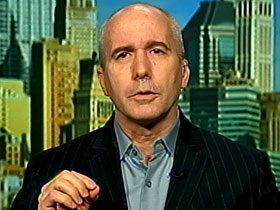
ABERNETHY: The pope needs to have a pretty keen sense of public relations, too, and there’s some evidence that’s been missing lately. Is that high on the list?
REESE: I think it needs to be. I mean, the papacy, whether you like it or not, you’re under constant view by the whole world. You’re on a world stage 24-7, and if you say things that don’t make sense to people or that come across badly to people, it causes great problems for the church.
ABERNETHY: David, there’s kind of a buzz word around called “new evangelization.” I gather than means evangelizing and going in, preaching the Gospel more vigorously, perhaps. What does that imply, and what does that imply particularly for the United States?
GIBSON: Well, the church, the Vatican, and the cardinals and bishops in the United States know that the Catholic Church in the modern world has to do a better job at preaching and evangelizing. It’s a marketplace out there in a way that it never was before. You know, people can be born Catholic and raised Catholic, but that’s not exactly the choice they’re going to make as adults. So they have to be out there competing. But again, it’s that word, preaching. Is it just about words? As Tom said, they elected the smartest man in the room the last two times out. Is it just about the words you use? Or is preaching and evangelizing also about actions? Do they need really a pastor, someone who can communicate through actions and gestures as much as through words?
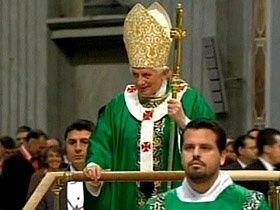
REESE: I think Pope Benedict expressed it very well. He said that Christianity should not be presented as a series of “nos”, but as a “yes,” a yes to love, a yes to life, a yes to justice and peace. You know, the principal job of the pope and of the whole church is to figure out how to preach the Gospel in a way that is understandable and attractive to people in the twenty-first century, especially to young people who are just turned off by religion.
ABERNETHY: Does that imply a kind of, what we think of as evangelical Protestantism, very vigorous, loud music, plenty of excitement? Can we look for that in South America, at least, from the church?
REESE: We’re seeing it in South America. We’re seeing it in Africa, with music and dance. We have to adapt Christianity—well, better put we have to express Christianity in different cultures in different ways. Remember Saint Augustine and Saint Thomas Aquinas. What they did in their time was take the best intellectual thought, for Augustine it was Neoplatonism, for Aquinas it was Aristotle, and express Christianity to their generations using those philosophers. Thomas Aquinas’s books were burnt by the bishop of Paris. We shouldn’t just quote Augustine and Aquinas. We should imitate them and figure out how to express Christianity in the best way that we can in this century.
LAWTON: I have a question that I wanted to get in. Also, just this very curious situation that we’re finding ourselves in, we will find ourselves in, where we’re going to have two popes or the pope emeritus and the new pope. That could create some tensions, that could in some ways, undermine the new pope, if the other pope is still around. Benedict says he’s going to be hidden from public life, but David, what—how do you see that working out? What pitfalls do you see?
GIBSON: I see it as becoming a real problem down the road. Initially, look, this was such a surprise to everyone. It shouldn’t have been a shock, really. Benedict sent a lot of signals that this was going to happen. If anyone could do it, it was this kind of very orthodox pope resigning, this kind of Nixon-to-China move almost, but—and it was natural that there was no real plan for what you would do with a pope emeritus. So, for security reasons and a lot of other reasons, I think it made sense that he should live inside the Vatican, at least at first, but I think it is going to become a problem down the road, especially if he continues to write and to publish some of his writings.
ABERNETHY: David, one of those that is mentioned from time to time as a possible pope is the Archbishop of New York, Timothy Dolan. Is there anything to that, you think?
GIBSON: I think it’s a great story. Don’t think it’s going to happen.
ABERNETHY: Okay. Our thanks to Father Tom Reese of the Woodstock Theological Center at Georgetown University and David Gibson of Religion News Service.
We want to revisit now a story we ran some years ago, on the process the cardinals follow when they choose a new pope. Again, Kim Lawton reports.

